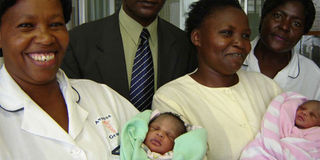DR BOSIRE: Beacon of hope for childless couples still attracts a lot of stigma

Dr Joshua Noreh (centre), with nurses holding Kenya’s first IVF babies at Avenue Hospital in Nairobi in 2006. PHOTO| FILE
I have no clue how it feels to grow up knowing you are a pioneer scientific wonder like Louise Brown.
Last week, she turned 40, marking a major milestone in the world of science. Louise was the first successfully conceived and delivered in vitro fertilisation (IVF) baby, a beacon of hope for childless couples across the world, leading the way for now eight million IVF babies across the globe.
They are popularly referred to as test tube babies, even though they spend only five days in the special culture dishes in the incubator, before being implanted in their mothers womb’s.
Closer home, the efforts of Dr Joshua Noreh, a gynaecologist and embryologist brought us Kenya’s first IVF babies, when he delivered two mothers via Caesarean section in May 2006.
Before then, IVF was seen as a medical procedure for the rich, who could fly out of the country to seek the service abroad at a price that was out of reach for ordinary citizens even in those countries where it was available. To do it at home, Dr Noreh had to convince pharmaceutical companies to bring in the expensive drugs used for the procedure and convince patients to have faith in him as he attempted the procedure with them.
For his faith, he will forever command special respect in the local obstetric/ gynaecology world. He opened doors for others to follow a path that was not easy. IVF has now become commonplace in Kenya and we can proudly say that the country provides the service even to couples from neighbouring countries.
STIGMA
However, even despite this lofty achievement, IVF is still loaded with stigma because it is linked to infertility or sub-fertility. Mothers are not ready to come out and admit that they conceived through IVF because of fear of the stigma attached to infertility.
They want to protect their little ones from the publicity such a miracle may attract. Yet, they shouldn’t have to live with a feeling of unease, fearing what the public, family and friends would think of them if they found out.
Forty-three-year-old Stella* is one such mum. After years of trying to conceive unsuccessfully, she sought the help of a gynaecologist. Several exhausting tests later, the doctor informed her and her husband that their best chance at conception was through IVF. It took her two years to accept the situation. In that time, her husband got a lucrative job offer in Europe.
Away from home, Stella’s yearning for a child hit a new high. She bit the bullet and the couple paid for IVF, which led to her conceiving twin boys, whose birth made her feel complete.
When they visited Kenya during summer, she couldn’t wait to introduce her sons to their only living grandparent – their paternal grandmother. But the encounter scarred her for life. Her mother-in-law’s comments tore her heart out.
She belittled Stella and made her feel like an incomplete woman, who had to be assisted to get babies.
What Stella had hoped would be a joyful moment, turned into a bitter experience. Years later, with three babies in tow (she got a daughter later), she made up with her mother-in-law, but it was not enough to erase the painful memory. Her children never got to bond with their grandmother.
This kind of stigma is getting in the way of optimising access to these crucial services. Many couples take too long to make the decision to go for IVF, even when financial constraint is not an issue.
The downside is that with every successive year the couple waits, the lower the success rate of the procedure. The female body is on a forward march to ageing in matters reproduction.
Our Kenyan 12-year-old pioneer girls are now joined by many other IVF babies in the country. They have brought immense joy to their families. They will grow up to be productive people in society and contribute positively to this country.
They will have children and ensure continuity of their family lines without bias. They are a part of us, the essence of who we are as Kenyans. They rely on us to break the stigma and allow the happiness they represent, to shine through!



